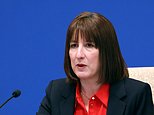

U.S. fiscal policy is 'on an unsustainable path,' says Powell
The rising U.S. deficit and overall fiscal policy remain headwinds to the economy, Federal Reserve Chair Powell said Thursday.
"The federal government's fiscal path, fiscal policy, is on an unsustainable path," Powell said. "The level of our debt relative to the economy is not unsuitable, the path is unsustainable.
"And we see that in a very large deficit, you're at full employment [and] that's expected to continue, so it's important that be dealt with," Powell added. "It is ultimately a threat to the economy."
— Brian Evans
Powell says he would not resign if Trump asked him to
During a press conference Thursday afternoon, Powell said he would not step down from his position as Fed chief even if President-elect Donald Trump asked him to.
"No," he said in response to a reporter's question on whether or not he would leave if Trump asked him to resign.
Later on, another reporter asked Powell if the president had the power to fire or demote him from his position. The Fed chair responded that such an action was "not permitted under the law."
— Lisa Kailai Han, Spencer Kimball
Monetary policy is still restrictive, says Powell
Despite recent positive economic data and Wednesday's stock market rally, Fed Chair Powell said the central bank is pursuing interest rate cuts as monetary policy still remains tight.
Powell emphasized that the Fed views lower bowering costs necessary for its dual mandate of ensuring maximum employment and price stability.
"We think that even with today's cut, policy is still restrictive," Powell told reporters at a press conference following the central bank's latest quarter-point percentage rate reduction.
— Hakyung Kim
Powell reveals one inflation report came in ‘a little higher than expected’
Fed Chair Powell said he is not worried about the economy despite one inflation report coming in "a little higher than expected."
"Overall, [we're] feeling good about economic activity," he said. "At the same time, we got one inflation report. … It wasn't terrible, but it was a little higher than expected."
"By December, we'll have more data, I guess one more employer report, two more inflation reports and lots of other data, and we'll make a decision as we get to December," Powell continued.
— Sean Conlon
Laffer Tengler's Anderson says now is the 'perfect point' for a Fed pause
Now marks an opportune time for the Federal Reserve to take a step back from its rate cutting campaign, according to Byron Anderson, head of fixed income at Laffer Tengler Investments.
"Without a credit crisis emerging, which is not evident at the moment, the greater risk to markets is adding stimulus to an already inflationary leaning environment," he said. "Many will disagree but this was the perfect point for the Fed to pause and reassess the landscape through the end of the year."
"If you believe the economy is on good footing, the risks to inflation are increasing with every rate cut they do," he added.
— Samantha Subin
Fed Chair Powell said policy is 'well positioned' to handle risks ahead
Federal Reserve Chair Jerome Powell speaks during a news conference following the Nov. 6-7 Federal Open Market Committee meeting at William McChesney Martin Jr. Federal Reserve Board Building in Washington, D.C., on Nov. 7, 2024.
Andrew Caballero-Reynolds | AFP | Getty Images
Federal Reserve Chair Powell said the central bank will watch what happens with the economy and inflation, and adjust policy accordingly.
"If the economy remains strong and inflation is not sustainably moving toward 2%, we can dial back policy restraint more slowly. If the labor market were to weaken unexpectedly, or inflation were to fall more quickly than anticipated, we can move more quickly," Powell said in prepared remarks during the press conference.
"Policy is well positioned to deal with the risks and uncertainties that we face in pursuing both sides of our dual mandate," he added.
— Sarah Min
Powell says Trump election won't affect Fed outlook
Donald Trump's presidential election victory will not be factoring directly into monetary policy, Fed Chair Powell said Thursday.
"In the near term, the election will have no effect on our policy decisions," Powell said.
However, he did issue a caveat that any change in administration could help shape Fed policy as the central bank seeks to lower interest rates.
"Just in principle, it's possible that any administration's policies or policies put in place by Congress could have economic effects over time," he said. "So, along with countless other factors, forecasts of those economic effects would be included in our models of the economy and would be taken into account."
— Jeff Cox
Fed Chair Jerome Powell says central bank is not 'on any preset course'
Fed Chair Powell expressed that the U.S. central bank had no concrete decisions going forward, as related to further interest rate reductions.
"In considering additional adjustments to the target range for the federal funds rate, the Committee will carefully assess incoming data, the evolving outlook and the balance of risks," Powell said in a press conference Thursday afternoon. "We are not on any preset course. We will continue to make our decisions, meeting by meeting."
— Lisa Kailai Han
Fed Chair Powell issues opening remarks
Federal Reserve Chair Powell spoke Thursday afternoon after the central bank issued a quarter-point rate cut. He also detailed policymakers' rationale around the decision.
— Darla Mercado
Labor market doesn't contribute significantly to price growth, Powell says
Fed Chair Powell said the job market is not a key driver of inflation.
"The labor market is not a source of significant inflationary pressures," Powell said.
The Fed chair said payroll expansion has slowed in recent months, while the unemployment rate has increased compared with a year ago. Overall, he said the labor market is viewed as less tight than just before the Covid-19 pandemic, but is still considered "solid."
— Alex Harring
Fed can take ‘a more deliberate’ pace on rate cuts from here, Bankrate chief financial analyst says
The central bank's move came in as expected, and it will likely continue taking a measured approach going forward, said Greg McBride, chief financial analyst at Bankrate.
"The Federal Reserve continues to lift the foot off the brake pedal, cutting interest rates by one-quarter percentage point, as expected," he said. "The solid pace of economic growth means the Fed can abandon the urgency seen with the half-point cut in September and take a more deliberate, quarter-point pace with this and future rate cuts."
He noted that the recent surge in Treasury yields dampens the effect of the rate cut, however.
"The big increase in mortgage rates, from 6.2% to 7% in the past 7 weeks, hits harder than a quarter-percentage point drop in a credit card rate," McBride added.
— Darla Mercado
Fed Chair Powell likely to get questions about Trump's proposed policies
U.S. Federal Reserve Chair Jerome Powell arrives for a press conference following a two-day meeting of the Federal Open Market Committee on interest rate policy, where Powell announced the Fed cut interest rates by a quarter of a percentage point, in Washington on Nov. 7, 2024.
Annabelle Gordon | Reuters
Fed Chair Powell is likely to face questions from reporters at the 2:30 p.m. ET press conference over the effects of tax and spending proposals promised in the incoming Trump Administration that takes office in January.
Donald Trump as president frequently railed against the Fed and Powell. In 2019, for example, he slammed the central bank several times, at one point saying it was a bigger obstacle to American prosperity than China.
— Scott Schnipper
Major averages hold steady after Fed issues anticipated rate cut
The three major averages did not change much after the Federal Reserve issued its expected rate cut of a quarter point.
The S&P 500 was last up nearly 0.7% around 2:10 p.m. ET, while the Nasdaq Composite was higher by 1.4%. The Dow Jones Industrial Average flickered near the flat line, up about 15 points.
— Darla Mercado
Federal Reserve cuts rates by a quarter point
Where markets stand ahead of the Fed's decision
At about 1:50 p.m. ET, the S&P 500 was up 0.6%, while the Nasdaq Composite surged 1.3%. The Dow Jones Industrial Average hovered near the flatline.
The 10-year Treasury yield was lower by 8 basis points, trading at 4.34%. The 2-year Treasury yield was at 4.2%, reflecting a decline of 6 basis points.
— Darla Mercado
Labor market will be focus of Powell remarks, D.A. Davidson's Ragan says
The current view of Fed officials on the labor market could be one of the big takeaways from Powell's press conference Thursday, according to James Ragan, director of wealth management research at D.A. Davidson.
"The biggest thing he can talk about is the jobs market because we had that hurricane-impacted number for October. Obviously a weak number, but I think the markets discounted it a lot for the hurricane impact. So I'd like to hear him talk a little a bit beyond that data," Ragan told CNBC.
The nonfarm payrolls report for October showed a gain of just 12,000 jobs. However, storms and a since-resolved strike of Boeing workers could have temporarily lowered that number, according to the Bureau of Labor Statistics.
— Jesse Pound
What to expect at the conclusion of the Fed’s November meeting
With the Federal Reserve expected to make a quarter-point cut on Thursday, the main event for markets will likely be Chair Jerome Powell's press conference at 2 p.m. ET.
Traders will be on the hunt for clues from Powell on the future path of rate policy. Fed funds futures trading suggests about a 63% chance that the central bank will issue another quarter-point cut in December, but traders are also weighing the likelihood that policymakers may choose to skip that month.
Further complexity lies ahead for the central bank in light of Donald Trump winning a second trip to the White House this week. That is because the new administration's plans include tax cuts and tariffs, which could affect the Fed's moves toward tamping down inflation.
Read more about the Fed's November meeting from CNBC's Jeff Cox here.
— Darla Mercado
How today’s consumer rates stack up against March 2022
The Federal Reserve is widely expected to trim rates by a quarter point on Thursday, taking another step toward unwinding its tight policy.
To that end, consumer rates have changed significantly since the Fed started its hiking campaign in March 2022, and in some corners of the market, interest rates have cooled slightly since the central bank made its first half-point cut in September.
The rate on a $30,000 home equity line of credit sits at 8.7% as of the week of Nov. 1, according to Bankrate. That is down from 9.25% in the week of Sept. 13, but still notably higher than the rate of 4.27% back in March 2022.
Credit card interest rates came in at 20.5% as of last week, per Bankrate, sharply higher than the 16.34% in March 2022. But they are marginally cooler compared to last month's rate of 20.78%.
The rate on a 30-year fixed mortgage was 7.09% as of the week of Nov. 1, sharply higher than the 4.29% in March 2022. However, it is also higher compared to the week of Sept. 13, when the rate was 6.12%.
That is because mortgage rates loosely follow the 10-year Treasury yield, which has recently taken a leg higher. Indeed, the benchmark yield stood at 4.363% during the week of Nov. 1, sharply higher than the 3.649% it traded at in mid-September.
— Darla Mercado, Nick Wells
Market sees a greater chance the Fed will skip rate cut in December
Traders went into Thursday's Fed meeting convinced that a rate cut was coming, but were growing less certain about what would happen in December.
The fed funds futures market pointed to a 100% chance that policymakers would ease, with just a sliver of a possibility that the cut might hit a half percentage point in September. Market-implied odds were about 99% for a quarter-point move, according to the CME Group's FedWatch tracker of 30-day fed funds futures contracts.
For December, odds of a pause are rising, at 32.6% as of midday Thursday, an increase of about 8 percentage points from a week ago. If the Fed doesn't skip December, the odds for that happening in January are about 68%, the CME gauge shows.
— Jeff Cox











